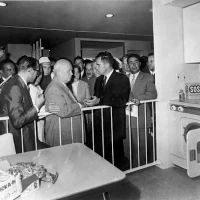Richard M. Nixon’s presidency was a tempestuous mix of stunning foreign policy achievements (his trip to China) and shameful lapses in morality and judgment (the Watergate scandal). After the host of criminal activities (bugging the offices of political opponents, harassing activist groups, and breaking into the Democratic Party headquarters) came to light, Nixon faced impeachment.… Read More "The Resignation of Richard M. Nixon"
The Death of Ambassador Arnold Raphel
U.S. relations with Pakistan have often had a disproportionate importance. In the 1980’s, they were again front and center in U.S. foreign policy as Washington ramped up its support for Afghan mujahedeen in their fight against the USSR. On August 17, 1988, matters took a stunning turn when the plane carrying Pakistani President Zia ul-Haq,… Read More "The Death of Ambassador Arnold Raphel"
The Proxy of My Proxy: Saudi Arabia vs. Egypt in North Yemen
Led by President Gamal Abdel Nasser, the Egyptians funneled money, arms, and eventually ground troops to support revolutionaries in North Yemen who had taken power through an Egyptian-sponsored coup on September 26, 1962. The Saudi Arabian government would not stand for the removal of a monarchy on its southern border by Nasserist forces. As such, the… Read More "The Proxy of My Proxy: Saudi Arabia vs. Egypt in North Yemen"
Freeing American Hostages in the First Gulf War
Shortly after Iraq invaded Kuwait on August 2, 1990, Saddam Hussein and his Republican Guard forces took hundreds of Americans and people of other nationalities hostage in Iraq and Kuwait. The intent was to use them as bargaining chips and forestall any military action against Iraq in retaliation for its invasion of Kuwait. With hundreds… Read More "Freeing American Hostages in the First Gulf War"
A Quiet Coup in the Caribbean: The Takeover of T&T
On July 27, 1990, a Muslim organization called Jamaat al Muslimeen instigated a coup against the government of Trinidad & Tobago. Forty-two insurgents stormed Parliament, taking Prime Minister A. N. R. Robinson and most of his cabinet hostage in The Red House, Trinidad’s parliamentary building, for six days. At the same time, another 72 rebels… Read More "A Quiet Coup in the Caribbean: The Takeover of T&T"
The Division of Cyprus: Paradise with a Problem
Cyprus gained independence from the United Kingdom on August 16, 1960, but the agreements that led to sovereignty failed to resolve serious differences between the Greek Cypriot and Turkish Cypriot communities. The first President of Cyprus, Archbishop Makarios III, introduced amendments to the constitution in 1963 to eliminate some of the provisions favoring the participation… Read More "The Division of Cyprus: Paradise with a Problem"
It was undoubtedly one of the most unorthodox – and therefore memorable – settings for a major political debate. On July 24th, 1959, the United States opened the American National Exhibition at Sokolniki Park in Moscow. The Soviets and Americans had agreed to hold exhibits in each other’s countries as a cultural exchange to promote… Read More "Nixon vs. Khrushchev — The 1959 Kitchen Debate"
Srebrenica and the Horrors of the Balkan War
The break-up of Yugoslavia caused some of the most heinous human rights violations and ethnic mass killings seen in the 70 years since the end of World War II. On July 11-13, 1995 the world stood by as Serbian forces under the command of Ratko Mladic systematically rounded up Bosnian and Croat boys and men… Read More "Srebrenica and the Horrors of the Balkan War"
Jordan’s Black September, 1970
In 1972, a group of Palestinian terrorists shocked the world by kidnapping eleven Israeli athletes during the Summer Olympics in Munich. They called themselves Black September. This name has its roots in the infamous “Black September” of 1970: a month of bloody fighting in Jordan between the forces of Jordanian King Hussein bin Talal and… Read More "Jordan’s Black September, 1970"
Douglas MacArthur, America’s Emperor of Japan
He was a general’s general, tough, unrelenting, a man who embraced the role history thrust on him. He was also haughty and controversial, traits that would lead to his eventual downfall. General Douglas MacArthur, Supreme Commander of the Allied Powers (SCAP), arrived in Japan on August 30, 1945 to oversee the ceremony formally marking its… Read More "Douglas MacArthur, America’s Emperor of Japan"

